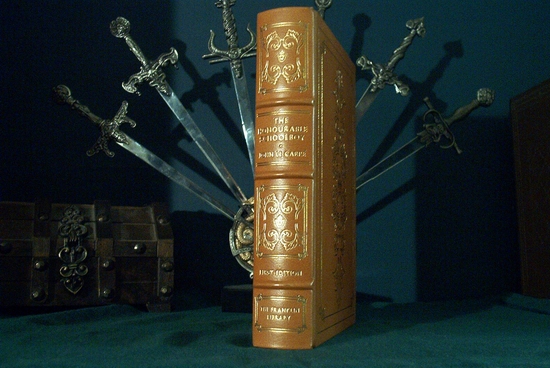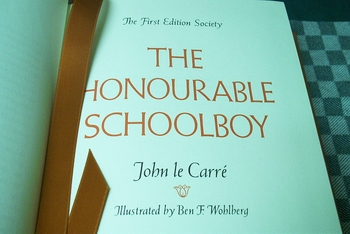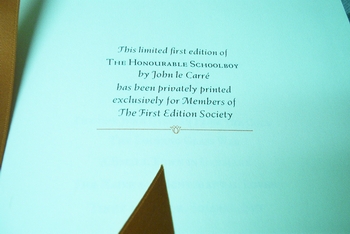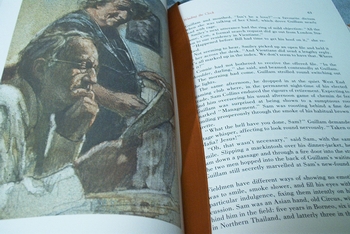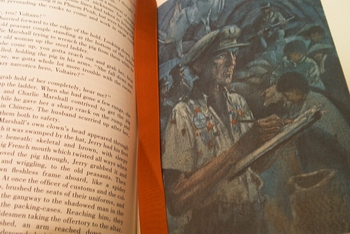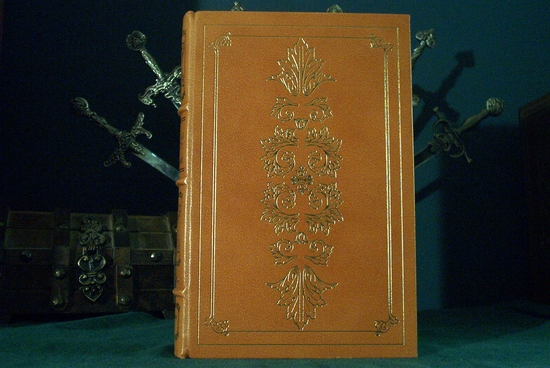John le Carré (pseudonym of David John Moore Cornwell, 19 October 1931 - 12 December 2020) was an English author of spy and espionage novels, many of which have been adapted for film and television. He worked for MI5 and MI6 in the 1950s and 1960s, before leaving the secret service to devote himself to writing after the success of The Spy Who Came In from the Cold.
Easton Press John le Carré books
A Perfect Spy - 1990Franklin Library John le Carré books
The Honourable Schoolboy - limited first edition ( not signed ) 1977Smiley's People - limited first edition (not signed) - 1979
Tinker Tailor Soldier Spy - Franklin Mystery series - 1988
Our Game - signed first edition - 1995
Single & Single - signed first edition - 1999
John le Carré biography
The son of Richard Thomas Archibald (Ronnie) Cornwell (1906–1975) and Olive (Gassy) Cornwell, John le Carré was born in Poole, Dorset, England on 19 October 1931. He has a brother Tony, a retired advertising executive, who is 2 years older. The actress Charlotte Cornwell is his younger sister, and the former Washington bureau chief of the Independent newspaper, Rupert Cornwell, is his younger half-brother. Le Carré states he did not know his mother, who abandoned him at the age of five, until he was reacquainted with her at the age of 21. He had a difficult relationship with his father, who had been jailed for insurance fraud and was constantly in debt.His father, Ronnie, made and lost his fortune a number of times due to elaborate confidence tricks and schemes which landed him in prison on at least one occasion. This was one of the factors that led to his fascination with secrets. His father was also the inspiration for the lead character in The Honourable Schoolboy (1977). Rick Pym, father of Magnus, the central character of A Perfect Spy, is also a con-man and schemer.
He began his formal schooling at St. Andrew's preparatory school near Pangbourne, Berkshire, and continued at Sherborne School but he was unhappy there with the harsh regime typical of English public schools at that time, and dropped out. He also disliked his housemaster, Thomas, who was a strong disciplinarian. From 1948–49, he studied foreign languages at the University of Berne.
In 1950 le Carré joined the British Army's Intelligence Corps in Austria, where his German proved useful in interrogating people who had fled westward across the Iron Curtain. In 1952 he returned to England to study at Lincoln College, Oxford where he carried out secret assignments for MI5, which included joining far-left groups in order to collect information about possible Soviet agents.
When his father went bankrupt in 1954, le Carré had to leave Oxford to teach at a boy's prep school. However, he was able to return to Oxford a year later, where he graduated with a First Class Honours B.A. degree in 1956. He then taught French and German at Eton College for two years before joining MI5 as a full-time official in 1958. His work in MI5 consisted of running agents, conducting interrogations, tapping phones, and performing authorized break-ins.
He started his first novel, Call for the Dead, while employed in the operational section of MI5, encouraged by Lord Clanmorris (who wrote crime novels under the pen-name of John Bingham). Lord Clanmorris was one of the two men—Vivian H. H. Green was the other—who inspired le Carré's most famous character, George Smiley. Green first met Cornwell as a schoolboy when he was the Chaplain and Assistant Master at Sherborne School (1942–1951), and then later as Rector at Lincoln's College.
In 1960, le Carré transferred to the foreign-intelligence service, MI6, working under the diplomatic cover of the Second Secretary in the British Embassy in Bonn. Then he was transferred to Hamburg as a political consul. There le Carré wrote his next 2 books: A Murder of Quality, a detective story, and The Spy Who Came In from the Cold, which became an all-time best-seller after its publication in 1963. Cornwell wrote under his pseudonym of John le Carré because it was not acceptable for members of the Foreign Office to publish under their own names. He left the service in 1964 to focus on writing full-time. John is Le Carré's second forename, whilst the words "le carré" mean "the square" in French.
His work was affected by Kim Philby, a British double agent (one of the Cambridge Five), who blew the cover of dozens of British agents to the KGB, David Cornwell among them. Years later, le Carré carefully depicted and analysed Philby's weakness and deceit in the guise of "Gerald" the mole, who is hunted by George Smiley in the central novel of le Carré's work, Tinker, Tailor, Soldier, Spy. Then followed the revelation that fictional spymaster George Smiley was modeled on Vivian H. H. Green.
In 1954, he married Alison Ann Veronica Sharp; they had three sons, Simon, Stephen and Timothy. They divorced in 1971. In 1972, he married Valérie Jane Eustace, a book editor with Hodder & Stoughton; this marriage produced one son, Nicholas, who writes as Nick Harkaway.
In 1964 he won the Somerset Maugham Award, an award established by Maugham to enable British authors under the age of 35 to enrich their writing by spending time abroad.
Le Carré resided in St Buryan, Cornwall, Great Britain, for much of his life where he owned a mile of cliff close to Land's End.
Le Carré's first two novels, Call for the Dead and A Murder of Quality, closely follow the mystery fiction approach, where the emphasis is on a complex riddle that hero George Smiley must solve. In later, longer works, such as The Honourable Schoolboy and The Night Manager, Le Carré approaches his material more as novelist and less as a mystery writer, focusing on the in-depth development of his characters.
Le Carré's work is in many ways a critical and reasoned response to the lurid sensationalism of the James Bond genre of spy writing. His heroes are three-dimensional, their engagement with the world is more realistic, and their circumstances are markedly unglamorous. There is little of the action thriller in his stories, no high-tech gadgetry and only a limited degree of violence; the drama comes primarily in the intensive mental activity of his protagonists. In some novels, such as A Small Town in Germany, almost the entire story unfolds in the form of dialogue between the major characters. Le Carré is widely hailed as writing some of the most literary and philosophically significant genre fiction of the 20th century.
His works also differ from the Bond books in that they are morally complex; there are constant reminders of the fallibility of western espionage systems and western countries in general, often with the implication that the Soviet bloc and the NATO bloc are essentially two sides of the same coin. The simplicity of the good-versus-SMERSH or SPECTRE world of Ian Fleming has no place in Le Carré's work, where the spies seem to serve espionage more than any ideology. Le Carré is more interested in the uncertainty inherent in spycraft—the most unimpeachable information from the enemy might always prove to be bait or a trap, a logic that tends to render the information obtained far less useful. In short, his books leave behind an unmistakable air of scepticism.
A Perfect Spy, Le Carré's most autobiographical novel, deals with the author's peculiar relationship with his father. Lynndianne Beene, the author of a biography of le Carré, describes Richard Cornwell as "an epic con man of little education, immense charm, extravagant tastes, but no social values". Beene quotes le Carré's reflection on the novel that "writing A Perfect Spy is probably what a very wise shrink would have advised".
In 2005, the film The Constant Gardener was released, based on his novel. The story is set in slums in Kibera and Loiyangalani, Kenya. The situation affected the crew to the extent that they set up the Constant Gardener Trust in order to provide basic education around these villages. Le Carré is a patron of the charity.
The Honourable Schoolboy
The Honourable Schoolboy is a spy novel originally published in 1977. It is the second novel in le Carré's famous Karla Trilogy, preceded by Tinker, Tailor, Soldier, Spy (1974) and followed by Smiley's People (1979). Set during the Cold War, the novel continues the story of British intelligence officer George Smiley as he navigates the complex world of espionage and international intrigue. The novel begins with the aftermath of the events of Tinker, Tailor, Soldier, Spy, which saw the exposure of a high-ranking Soviet mole within British intelligence known as "Gerald." With the mole unmasked and forced into exile, British intelligence is left reeling and in need of a new direction. George Smiley, recently reinstated as head of the British intelligence agency known as "The Circus," is tasked with rebuilding the organization and uncovering the full extent of Soviet infiltration.As Smiley delves deeper into the world of espionage, he becomes aware of a vast network of corruption and betrayal that stretches from London to Hong Kong. His attention is drawn to Jerry Westerby, an "honourable" British journalist and secret intelligence asset known as "the schoolboy," who has been tasked with uncovering a major Soviet operation in Southeast Asia. Westerby's investigation takes him to Hong Kong, where he uncovers a complex web of intrigue involving drug smuggling, money laundering, and political manipulation. As the plot unfolds, Smiley and Westerby find themselves drawn into a dangerous game of cat and mouse with Soviet intelligence and their own internal enemies. Along the way, they encounter a cast of colorful characters, including rogue spies, corrupt officials, and disillusioned revolutionaries, all of whom are caught up in the machinations of the Cold War.
The Honourable Schoolboy is praised for its intricate plotting, richly drawn characters, and penetrating insight into the world of espionage. Le Carré's meticulous attention to detail and his exploration of moral ambiguity and human frailty make the novel a compelling and thought-provoking read. With its gripping narrative and geopolitical intrigue, The Honourable Schoolboy stands as a testament to John le Carré's skill as a storyteller and his ability to capture the complexities of the Cold War era. It remains a beloved classic of the spy thriller genre and an essential read for fans of espionage fiction.
Smiley's People
Smiley's People, published in 1979, is the third novel in le Carré's acclaimed Karla Trilogy, preceded by Tinker, Tailor, Soldier, Spy (1974) and The Honourable Schoolboy (1977). Set during the Cold War, the novel follows the continued efforts of British intelligence officer George Smiley as he confronts his Soviet nemesis, Karla, in a high-stakes game of espionage and deception. The novel picks up the story of George Smiley, who has been forced into retirement from British intelligence (known as "The Circus") following the events of Tinker, Tailor, Soldier, Spy. However, when an old Soviet general, General Vladimir, is murdered in London, Smiley is drawn back into the world of espionage to investigate the circumstances surrounding the killing. As Smiley delves deeper into the case, he becomes convinced that General Vladimir's death is connected to Karla, the elusive Soviet spymaster who has long been Smiley's adversary. With the help of his former colleagues at The Circus, including Peter Guillam and Toby Esterhase, Smiley embarks on a covert operation to uncover Karla's network of agents and unravel the mystery behind the general's murder.As the plot unfolds, Smiley's investigation takes him to East Germany, Czechoslovakia, and ultimately to Paris, where he confronts Karla in a tense and dramatic showdown. Along the way, Smiley encounters a cast of memorable characters, including defecting spies, double agents, and disillusioned revolutionaries, all of whom are caught up in the dangerous world of Cold War espionage.
Smiley's People is praised for its intricate plotting, richly drawn characters, and atmospheric depiction of the Cold War era. Le Carré's masterful storytelling and his exploration of themes such as loyalty, betrayal, and moral ambiguity make the novel a compelling and thought-provoking read. With its gripping narrative and geopolitical intrigue, Smiley's People is considered one of John le Carré's finest works and a classic of the spy thriller genre. It stands as a testament to le Carré's skill as a writer and his ability to capture the complexities of the Cold War era, cementing his reputation as one of the preeminent authors of espionage fiction.
Tinker Tailor Soldier Spy
Tinker Tailor Soldier Spy, published in 1974, is the first novel in le Carré's celebrated Karla Trilogy, followed by The Honourable Schoolboy (1977) and Smiley's People (1979). Set during the Cold War, the novel follows the efforts of British intelligence officer George Smiley as he investigates the presence of a Soviet mole within the highest echelons of the British Secret Service. The novel opens with the abrupt retirement of George Smiley from British intelligence, known colloquially as "The Circus," following a failed operation in Czechoslovakia. However, when rumors surface of a Soviet mole operating within the highest levels of British intelligence, Smiley is reluctantly drawn back into service to root out the traitor.As Smiley delves deeper into the case, he begins to suspect that the mole is one of four high-ranking British intelligence officers, code-named "Tinker," "Tailor," "Soldier," and "Poorman." With the help of his trusted allies, including Peter Guillam and Connie Sachs, Smiley embarks on a covert investigation to uncover the identity of the mole and neutralize the threat posed by Soviet infiltration. As the plot unfolds, Smiley encounters a web of deceit, betrayal, and treachery that spans decades and reaches into the highest levels of government. Along the way, he must navigate a complex maze of relationships, alliances, and rivalries as he seeks to uncover the truth and restore integrity to British intelligence.
Tinker Tailor Soldier Spy is praised for its intricate plotting, richly drawn characters, and atmospheric depiction of the Cold War era. Le Carré's masterful storytelling and his exploration of themes such as loyalty, betrayal, and moral ambiguity make the novel a compelling and thought-provoking read. With its gripping narrative and geopolitical intrigue, "Tinker Tailor Soldier Spy" is considered one of John le Carré's finest works and a classic of the spy thriller genre. It stands as a testament to le Carré's skill as a writer and his ability to capture the complexities of the Cold War era, cementing his reputation as one of the preeminent authors of espionage fiction.
A Perfect Spy
A Perfect Spy is a novel written by British author John le Carré, first published in 1986. It is widely regarded as one of le Carré's most autobiographical works, drawing heavily on his own experiences and relationships to craft a complex and compelling narrative. The novel explores themes of identity, loyalty, and betrayal through the story of Magnus Pym, a British intelligence officer who embarks on a journey of self-discovery and self-destruction. The novel opens with the disappearance of Magnus Pym, a high-ranking British intelligence officer, who vanishes without a trace, leaving behind a trail of deception and intrigue. As his colleagues and family members search for answers, they uncover a web of lies and secrets that reveal the true nature of Pym's life and career.Through a series of flashbacks and recollections, the novel traces Pym's journey from his childhood in rural England to his rise through the ranks of British intelligence. Along the way, readers are introduced to a cast of characters who have shaped Pym's life, including his enigmatic father Rick, his mentor Jack Brotherhood, and his closest friend and confidant Axel. As Pym's story unfolds, it becomes clear that he is not only a master spy but also a deeply flawed and complex individual. His relationships with his family, his colleagues, and his handlers are marked by deception and manipulation, as he struggles to reconcile his loyalties to his country with his own personal ambitions and desires.
A Perfect Spy is known for its intricate plotting, richly drawn characters, and psychological depth. Le Carré's masterful storytelling and his exploration of themes such as identity, betrayal, and the nature of espionage make the novel a compelling and thought-provoking read. With its gripping narrative and introspective tone, A Perfect Spy is considered one of John le Carré's most ambitious and accomplished works. It stands as a testament to le Carré's skill as a writer and his ability to capture the complexities of human nature, earning him a place among the greatest authors of contemporary literature.
A Delicate Truth
A Delicate Truth, published in 2013, revolves around a covert counterterrorism operation known as "Wildlife," orchestrated by British and American intelligence agencies. The operation takes place on the fictional island of Gibraltar and is intended to capture a high-value terrorist target. However, when the operation goes awry, protagonist Toby Bell, a British civil servant, becomes embroiled in a web of conspiracy and betrayal. As Toby delves deeper into the truth behind "Wildlife," he uncovers a disturbing reality that challenges his beliefs about loyalty, morality, and the nature of government secrecy. Through its gripping narrative and intricate plot, A Delicate Truth explores themes of government accountability, the ethics of intelligence operations, and the human cost of political expediency.
Our Game
Our Game, published in 1995, follows the character of Tim Cranmer, a retired British intelligence officer living a quiet life in Cornwall. Cranmer becomes embroiled in a complex web of espionage and betrayal when his former protégé, Larry Pettifer, resurfaces after years in hiding. Pettifer is suspected of involvement in a botched operation in Russia and is pursued by both British and Russian intelligence agencies. As Cranmer navigates the treacherous world of espionage, he is forced to confront his own loyalties, betrayals, and the moral ambiguity of his past actions. Set against the backdrop of the dissolution of the Soviet Union and the chaos of post-Cold War Russia, Our Game is a gripping tale of intrigue, deception, and the high stakes of international espionage.
Single & Single
Single & Single, published in 1999, is centered around the world of international finance and espionage, focusing on the intertwined lives of two characters: Oliver Single, a successful British lawyer working in London, and his estranged son, Oliver Junior, who becomes embroiled in the shady dealings of his father's business empire. When Oliver Junior is implicated in a money-laundering scheme involving a Russian crime syndicate, he seeks refuge in Russia, setting off a chain of events that brings him into conflict with both his family and powerful forces in the world of international finance and intelligence. As the story unfolds, the novel delves into themes of family loyalty, betrayal, and the moral complexities of the global financial system. Through its intricate plot and richly drawn characters, Single & Single offers a gripping exploration of the intersection between personal relationships and the shadowy world of high-stakes finance and espionage.
The Spy Who Came in From the Cold
The
Spy Who Came in From the Cold is a novel published in 1963 and Set
during the Cold War. The story follows Alec Leamas, a British
intelligence officer who is sent on a dangerous mission to East Germany.
Leamas pretends to defect to the East in order to infiltrate the
enemy's ranks and gather intelligence. However, as the operation
unfolds, Leamas becomes entangled in a web of deceit and betrayal,
leading to tragic consequences for himself and those around him. The
novel is praised for its gritty realism, complex characters, and moral
ambiguity, and is considered one of le Carré's finest works. Through its
gripping narrative and atmospheric depiction of Cold War espionage, The
Spy Who Came in From the Cold offers a compelling exploration of
loyalty, sacrifice, and the human cost of espionage.
Agent Running in the Field
Published
in 2019, the story follows Nat, a veteran British intelligence officer
nearing retirement, who becomes involved in a complex web of intrigue
when he encounters Ed, a charismatic and enigmatic young man with
connections to Russian intelligence. As Nat navigates the murky waters
of espionage and personal relationships, he must confront his own
loyalties, motivations, and the shifting dynamics of the geopolitical
landscape. Set against the backdrop of Brexit-era Britain, the novel
explores themes of betrayal, disillusionment, and the moral complexities
of modern espionage. Through its compelling narrative and richly drawn
characters, Agent Running in the Field offers a gripping and
thought-provoking exploration of loyalty, identity, and the enduring
shadow of the Cold War.
Bibliography
Call for the Dead - (1961)A Murder of Quality - (1962)
The Spy who Came in from the Cold - (1963)
The Incongruous Spy (omnibus) - (1964)
"Call for the Dead"
"A Murder of Quality"
The Looking-Glass War - (1965)
A Small Town in Germany - (1968)
The Naïve and Sentimental Lover - (1971)
Tinker, Tailor, Soldier, Spy - (1974)
The Honourable Schoolboy - (1977)
Smiley's People - (1979)
"Tinker, Tailor, Soldier, Spy"
"The Honourable Schoolboy"
"Smiley's People"
The Little Drummer Girl - (1983)
A Perfect Spy - (1986)
The Russia House - (1989)
The Secret Pilgrim - (1991)
The Unbearable Peace - (1991)
The Night Manager - (1993)
Our Game - (1995)
The Tailor of Panama - (1996)
Nervous Times - (1998) (lim. ed. of 250)
Single & Single - (1999)
The Constant Gardener - (2001)
Absolute Friends - (2003)
The Mission Song (2006)
A Most Wanted Man (2008)
Our Kind of Traitor (2010)
A Delicate Truth (2013)
A Legacy of Spies (2017)
Agent Running in the Field (2019)
Silverview (2021)
Interviews
In February 1999, Cornwell was the guest in an episode of BBC Radio 4's Book Club broadcast with presenter James Naughtie and an audience in Penzance.In October 2008 an interview on BBC Four was broadcast, in which Mark Lawson asked him to name a Best of le Carré list of books; the novelist answered: The Spy Who Came in from the Cold, Tinker Tailor Soldier Spy, The Tailor of Panama and The Constant Gardener.
In September 2010, Cornwell was interviewed at his house in Cornwall by the journalist Jon Snow for Channel 4 News. The conversation involved several topics: his writing career generally and processes adopted for writing (specifically about his latest book, Our Kind of Traitor, involving Russia and its current global influences, financial and political); his SIS career, discussing why – both personally and more generally – one did such a job then, as compared to now; and how the earlier fight against communism had now moved to the hugely negative effects of certain aspects of excessive capitalism. During the interview he said that it would be his last UK television interview. While reticent about his exact reasons, those he was willing to cite were that of slight self-loathing (which he considered most people feel), a distaste for showing off (he felt that writing necessarily involved a lot of this anyway) and an unwillingness to breach what he felt was the necessarily solitary nature of the writer's work. He was also wary of wasting writing time and dissipating his talent in social success, having seen this happen to many talented writers, to what he felt was the detriment of their later work.
A week after this appearance, Cornwell was interviewed for the TV show Democracy Now! in the United States. He told the interviewer, Amy Goodman, "This is the last book about which I intend to give interviews. That isn't because I'm in any sense retiring. I've found that, actually, I've said everything I really want to say, outside my books. I would just like—I'm in wonderful shape. I'm entering my eightieth year. I just want to devote myself entirely to writing and not to this particular art form of conversation."
The December 2010 Channel 4 broadcast John Le Carre: A Life Unmasked was described as his "most candid" television interview.
In the February 2011 edition of Sunday Morning, Cornwell was interviewed on the CBC's Writers and Company, saying to Eleanor Watchtel that this would be his last interview.
Cornwell was interviewed at the Hay on Wye festival on 26 May 2013. The video of the event is offered for sale by Cornwell to raise money to keep Hay Library open.
